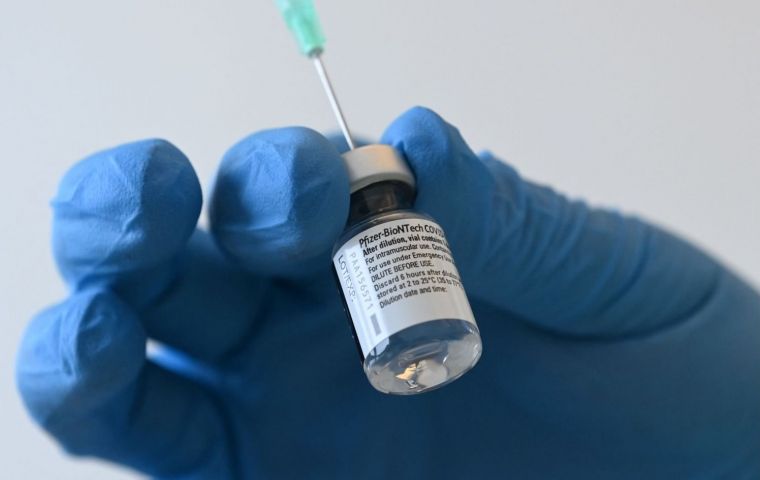MercoPress. South Atlantic News Agency
Anti covid-19 vaccination of teenagers starts in Chile with Pfizer
 Vaccination in Chile is not compulsory, but Piñera wants to reach everybody.
Vaccination in Chile is not compulsory, but Piñera wants to reach everybody. Chile will begin vaccinating people under 18 years of age against the coronavirus, according to an announcement by President Sebastián Piñera Tuesday. The Pfizer drug is the only one to be used in this age group.
“Today we are going to start vaccinating children from Sename (National Service for Minors), collaborating centers, health care centers and children with special morbidity, but the objective is to vaccinate all young people between 12 and 17 years old,” Piñera explained.
Chile currently handles vaccines from Sinovac, AstraZeneca, CanSino and Pfizer-BioNTech. The latter will be used on teenagers aged 12 or over, according to the authorization granted by the Institute of Public Health (ISP) at the end of May. The country has recorded over 1.5 million cases and more of 31,000 deaths.
Piñera also announced children under 12 will be added once the ISP authorization is issued. Since vaccination is scheduled by age in a decreasing order, first to be inoculated Tuesday were those aged 19, it was reported.
Read also: Vaccination for teenagers aged 17 to 12 starts in Uruguay
The president highlighted the efficacy and safety of the drugs, recalling that a person who received both doses has about a third less chance of contracting the virus and less than a tenth of ending up hospitalized compared to a person who has not been vaccinated.
To date, more than 21.1 million doses have been administered in Chile and more than 9.3 million people received the full treatment, and the immunized population exceeds 12 million. Although vaccination is voluntary, Piñera invited a group of at least two million laggards to join the process.
“We will continue to provide very important incentives for people who get vaccinated and, of course, we will continue to try to convince and pressure those who have not yet been vaccinated to do so,” said the president.
One of the incentives is the so-called Mobility Pass, which can be accessed by people who have had both doses and have exceeded the subsequent 14-day period, to move without having to obtain a special permit within their commune (neighborhood) even if they are quarantined.
On the other hand, the Chilean President admitted that the Government is “analyzing and conducting many scientific studies” to determine whether it is necessary or convenient to apply a third dose of the vaccines. “When we have finished these studies we will make, as we have always done, the decision that best protects the health and lives of all our compatriots,” he said.
According to Vivienne Bachelet, an epidemiologist at the University of Santiago de Chile and a first cousin of former President Michelle Bachelet who is also a physician by profession, it is likely that a new dose will be needed, but it shall depends on each laboratory. “Each vaccine has to develop studies that show when this third dose is applied and what adjustment the vaccines have to make so that they can be effective against the variants that are emerging,” she told CNN Chile.
The epidemiologist stressed that there are still not enough studies on the Chinese pharmaceutical Sinovac in terms of its effects against the variants of the virus, while Pfizer acknowledged that a third dose is probably required. She also pointed out that it was too soon to speak of a third dose when there are so many cases in Chile and suggested that measures such as those in New Zealand or Australia be adopted, in which cases of possible variants are detected at the borders.
As countries are beginning to lower the vaccination age range, the World Health Organization (WHO) does not yet advise that children and adolescents be inoculated with the formulas available on the market and would rather wait for more studies to be done on the effect of vaccines on minors, who in general suffer from covid-19 in a milder way than adults.
“We still do not have enough data on the use of covid-19 vaccines in children to recommend that they be vaccinated. … However, they should continue to receive the recommended childhood vaccines,” a WHO report said.




Top Comments
Disclaimer & comment rulesCommenting for this story is now closed.
If you have a Facebook account, become a fan and comment on our Facebook Page!